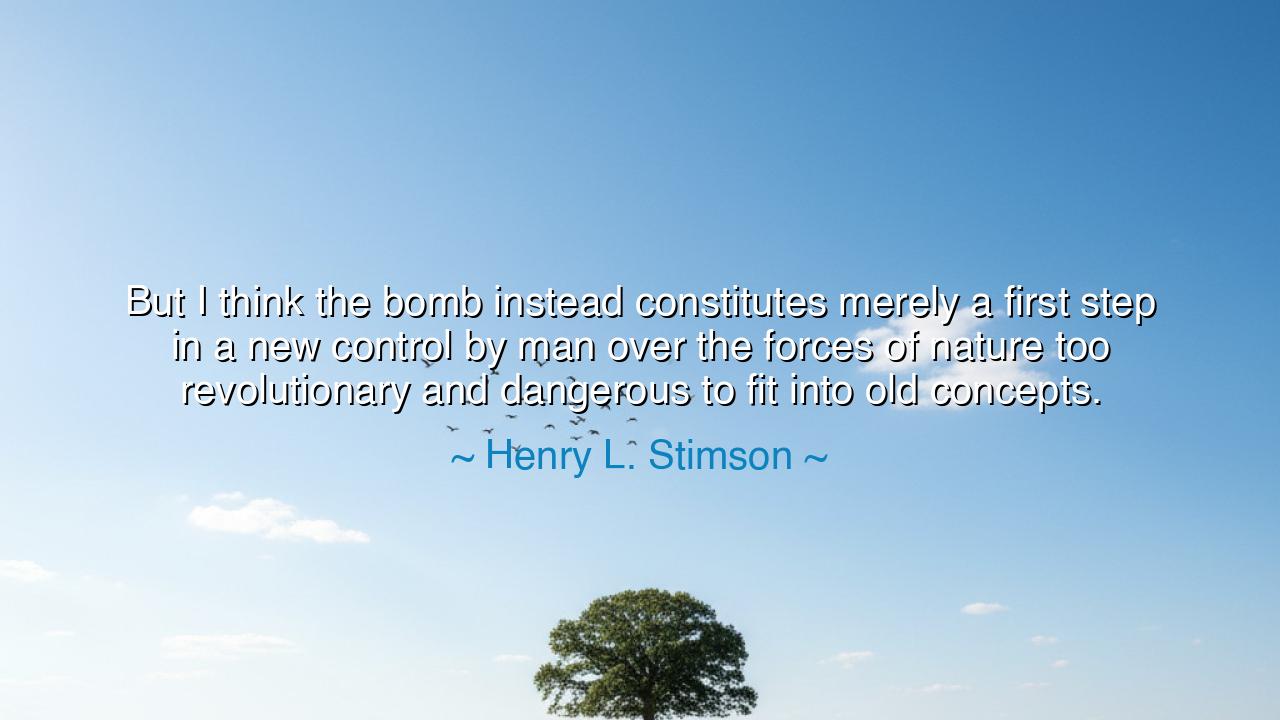
But I think the bomb instead constitutes merely a first step in
But I think the bomb instead constitutes merely a first step in a new control by man over the forces of nature too revolutionary and dangerous to fit into old concepts.






The American statesman Henry L. Stimson, who served as Secretary of War during the final years of the Second World War, looked upon the dawn of the nuclear age and declared with sobering clarity: “But I think the bomb instead constitutes merely a first step in a new control by man over the forces of nature too revolutionary and dangerous to fit into old concepts.” In these words he names the atomic bomb not merely as a weapon of war, but as a threshold—an entrance into an era where mankind had seized powers once thought to belong to the gods. His warning is that such powers could not be understood, restrained, or guided by the frail traditions of the past.
The bomb, in Stimson’s vision, was not an end but a beginning. It revealed that human ingenuity had unlocked forces buried in the very heart of matter. The splitting of the atom was more than a scientific feat; it was the unleashing of energies older than the stars themselves. And once this was achieved, humanity could not return to innocence. Old frameworks—laws of war, notions of conquest, habits of diplomacy—were too small to contain this new reality. A power had emerged so vast that it demanded new wisdom, lest it consume its masters.
Consider the story of Hiroshima and Nagasaki. In those cities, entire communities were turned to ash in moments, shadows burned into stone where men and women once stood. The old concepts of siege and battlefields, of armies clashing upon plains, no longer applied. With a single decision, entire populations could be extinguished. Stimson, who had overseen the use of this weapon, understood that humanity had crossed a threshold where destruction could no longer be measured in soldiers lost, but in civilizations shattered.
History provides parallels. When fire was first mastered by primitive man, it brought warmth and light, but also destruction. When gunpowder was born, the castles of Europe crumbled, and war was forever changed. Yet in each case, the magnitude of the power was limited. The atomic bomb was different: it was the first tool that gave man the power to annihilate not merely enemies, but the very earth that sustained him. In this, Stimson saw a revolution of such scale that the old concepts of statecraft and morality would falter if not renewed.
His words are not only about weapons, but about the nature of knowledge and power. Humanity’s advances in science will always open doors to powers we do not fully understand. Whether in nuclear energy, in genetic manipulation, in artificial intelligence, or in climate control, each step is both triumph and peril. Stimson teaches that we must not naively trust the tools of yesterday to govern the storms of tomorrow. New power demands new wisdom, new ethics, new humility.
The lesson is clear: we must never allow our mastery over nature’s forces to outpace our mastery over ourselves. The measure of civilization is not what powers it unlocks, but how it governs them. To wield the fire of the atom, or the secrets of the genome, or the intelligence of machines, requires discipline, foresight, and moral courage. Without these, humanity risks becoming the destroyer of its own world.
Practically, this calls us to vigilance and responsibility. Support leaders who act not in arrogance but in humility before such powers. Cultivate in ourselves a spirit that seeks wisdom as fiercely as it seeks knowledge. Teach the young not only how to create, but how to restrain. And above all, remember that the first step, as Stimson warned, is never the last—each advance demands a greater watchfulness, lest the gift of knowledge become the curse of ruin.
Thus, Stimson’s words stand as both warning and prophecy. The bomb was not merely a weapon—it was the unveiling of a truth: that man had taken into his hands the forces of creation and destruction. And if we are to survive and flourish, we must not try to force these powers into the old concepts, but instead rise to new wisdom worthy of the fire we now command.






AAdministratorAdministrator
Welcome, honored guests. Please leave a comment, we will respond soon